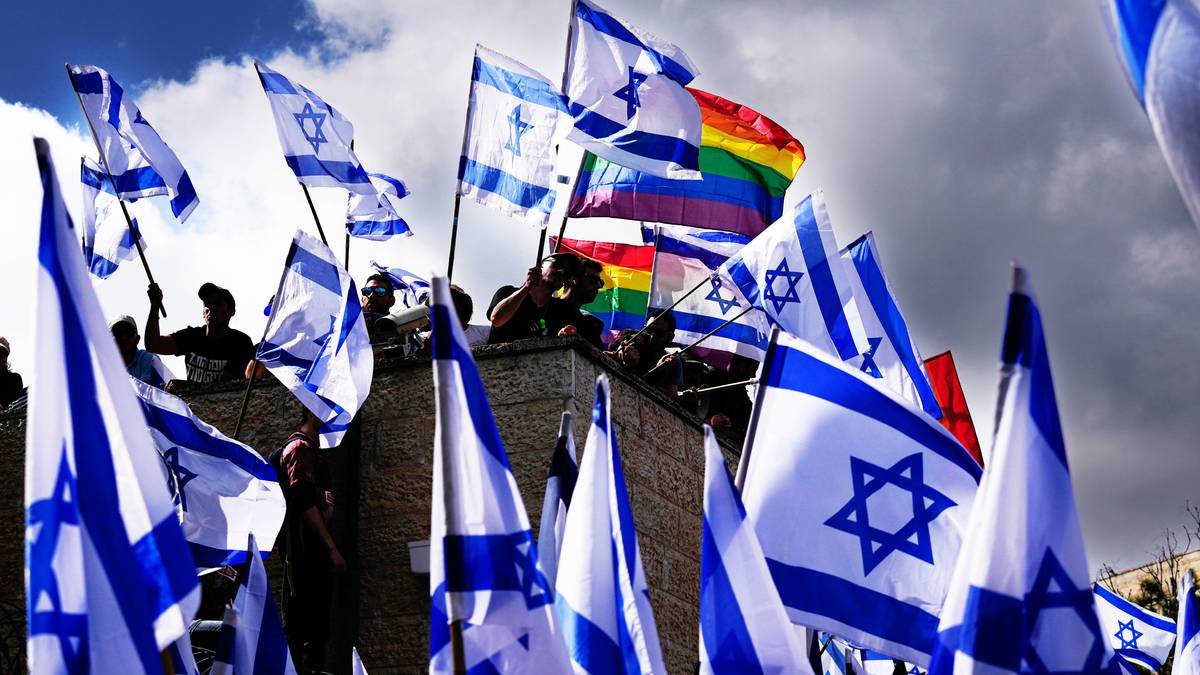Israeli embassies around the world went on strike to protest the proposal to change the country’s judiciary. This is what Embassy Counselor Yana Kotlyar Gal told NRK.
– Everyone at the embassy in Oslo is on strike, including the ambassador and me, Kotlyar-Gal reports to NRK.
She says it was their trade union, which has a total membership of 800,000 members in several sectors, that prompted them to strike.
– I don’t know how long the strike will last, she says and adds that she and all the others are waiting for what Prime Minister Netanyahu will say later on Monday.
Kotlyar-Gal is careful not to say what she thinks about the controversial proposal on legal form, but does offer a brief commentary on what’s going on in Israel.
– It is a revelation of Israeli democracy, you say.

The Israeli Embassy in Parkvien in Oslo is where everyone hits.
Photo: Nader Alam/NRK
Tens of thousands are demonstrating
Tension is high in Israel. Tens of thousands of people are demonstrating in several places in the country.
Outside the Knesset building in Jerusalem, demonstrators wave the Israeli flag, demanding that politicians not be able to bypass the courts.
The Histadrut, Israel’s largest trade union with 800,000 members, is calling for a general strike and temporarily suspending flights from Ben Gurion Airport. The ports of Haifa and Ashdod were also affected by the strikes. This could paralyze large parts of the Israeli economy.
Waiting for the press conference
Everyone is waiting for an announced press conference with Prime Minister Benjamin Netanyahu, but it has been postponed due to disagreements in Israel’s relatively new right-wing government.
Earlier today, Haaretz reported, among other things, that sources in the ruling Likud party said that Benjamin Netanyahu is likely to put reform plans aside. The weekend was marked by massive demonstrations in Tel Aviv.
Judicial reform is also complex for the prime minister. For this It also means that Netanyahu, who is accused of corruption, cannot be forced to resign over the allegations.
Big splits
Netanyahu has rejected the corruption allegations.

Police in Jerusalem arrested the demonstrators on Sunday evening.
Photo: Ronen Zvulun/Reuters
Critics call the reform the end of democracy in Israel, and believe it is tailor-made for the prime minister.
The reform also created major divisions in the party. Defense Minister Yoav Gallant asked his prime minister on Saturday to temporarily halt judicial reform.

A demonstrator wears a mask to represent Prime Minister Netanyahu.
Photo: Maya Alleruzzo/AP
He was fired on Sunday. The defense minister responded via Twitter that “Israel’s security has always been and will be his life’s mission.”
Netanyahu and his supporters believe the proposed changes are necessary to rein in too much judicial power.
Mart Heijn-Engdahl, deputy director of the NOREF Center for Conflict Resolution, believes it is not clear why this reform is necessary.
– Elected representatives should have more power than the judge, and this is the rationale behind the changes they are proposing. But if that was the purpose, why should it be finished before Easter, she says and continues:
– After all, he is on trial for corruption and financial backwardness from previous years in power. It’s easy to imagine if he was behind here as part of his haste.
Itamar Ben Gvir of the Coalition Party wrote on Twitter that the government must not give up.
– Reform must not stop, and we must not give in to chaos, the minister wrote, among other things.
Benjamin Netanyahu is accused of corruption. Itamar Ben Gvir was convicted of supporting a terrorist organization. Now they rule Israel, and for several weeks hundreds of thousands of Israelis have demonstrated against the new government. They fear that Israel will become a dictatorship.
On Monday, a motion of no confidence in Netanyahu was voted on.
– The Prime Minister is no longer eligible
At the same time, Israeli President Isaac Herzog told the government to turn around.
– For the sake of the unity of the Israeli people, I ask you to stop the reform immediately, the president wrote on Twitter.
After Gallant was fired, thousands gathered for demonstrations in Tel Aviv on Sunday night.
Many also gathered outside Netanyahu’s home. Police used water cannons to disperse the demonstrators.

Today, Israeli Prime Minister Benjamin Netanyahu will hold a press conference on judicial reform.
Photo: Paul/Reuters
One protester told Reuters they felt they had no choice but to demonstrate outside his home.
We have to show up and say this has to stop. This prime minister is no longer eligible.
Foreign Minister Anken Huitfeldt agrees that democracy in Israel is in danger.
– DrShe told NRK that a step was being taken in the direction of increasing political control over the court.
– How does what is happening in Israel affect Norway’s relationship with Israel?
– Now we have to see how this issue develops, but it is the case that Norway and many other democratic countries raise these questions when we meet with representatives of Israel, he says. Hoetfeldt.

“Organizer. Social media geek. General communicator. Bacon scholar. Proud pop culture trailblazer.”

